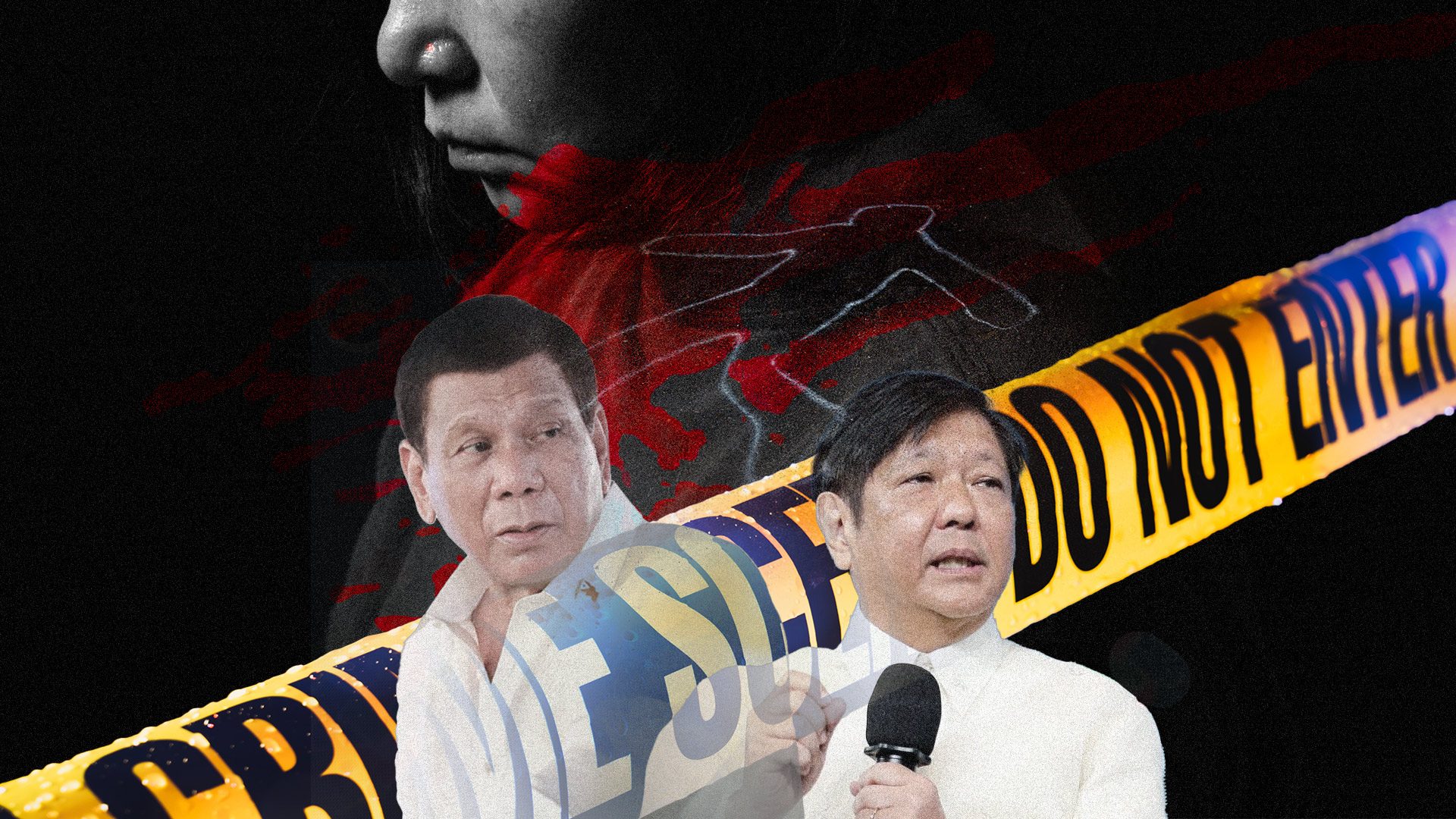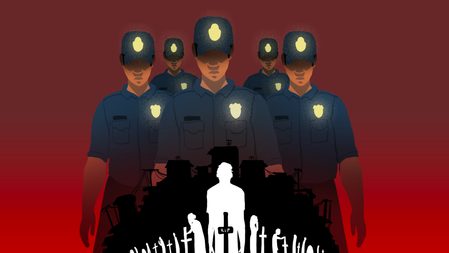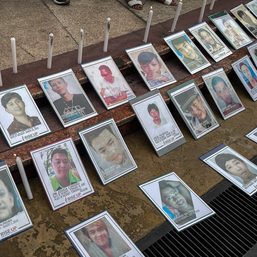SUMMARY
This is AI generated summarization, which may have errors. For context, always refer to the full article.

First of two parts
MANILA, Philippines – Death knocked on almost every door in one densely populated northern Metro Manila community in Rodrigo Duterte’s Philippines.
Carmen*, a woman in her senior years, watched with fear as her neighbors were routinely gunned down by police during anti-illegal drug operations. She joined in the grieving as people she’d known for years were found bloodied and lifeless in dark streets, killers never to be identified.
Men were killed inside their homes, in front of their families, at their most vulnerable, in the name of the government’s war on drugs that also took the lives of thousands of Filipinos elsewhere in the country.
In between devastating news of deaths, Carmen prayed her loved ones would be spared from the violence that had become almost a part of her community’s daily life. Please not my family, she often uttered under her breath as signs of another police operation became visible at night.
By May 31, 2022, a month before Duterte’s presidential term ended, at least 6,252 people were killed in police operations alone. The death toll has been estimated to be between 27,000 to 30,000 if victims of extrajudicial killings are included.
Duterte left Malacañang on June 30, 2022. He was succeeded by Ferdinand Marcos Jr., the dictator’s son who had never made his stand on Duterte’s war on drugs explicit. Carmen, who voted for Marcos, thought the worst was over.
In August 2022, violence again reared its ugly head and this time, it hit Carmen’s home. Her worst fears became reality barely two months into the Marcos presidency.
Rolly, her 21-year-old adopted son, was found dead far from the family home. His lifeless body was floating in a creek, surrounded by trash and wild plants, like thousands of other Filipino victims during Duterte’s term.
“Akala ko kapag nagbago na ang ating presidente, magbabago na ang lahat,” she told Rappler in an interview on Tuesday, June 6. “Akala namin matatapos na ang lahat, pero mauulit lang rin pala ang dating nangyari na patayan nang patayan, pati na ang anak ko ay nadamay pa.”
(We thought everything would change, but the repeated killings of before would just recur. Even my child was not spared.)
‘Why kill my son?’
Carmen was not at home when she heard the news. She was outside Metro Manila, far away from her family, when she got the message that Rolly had been killed. Carmen was surprised, then felt the unmistakable pang of grief mixed with anger. The next time she saw her adopted son, he was already in a casket.
Carmen desperately wanted to know why Rolly was killed.
He was last seen alive when he joined some friends for a drinking session, according to news that reached the family. Carmen said he didn’t drink, so he probably went for the company. He went missing before turning up dead some hours later.
“Hindi ko naman akalain na magiging biktima siya kasi wala naman siyang bisyo, wala naman siyang kaaway, wala siyang ginagawang masama,” Carmen said. “Akala ko nakaligtas na kami sa gulo ni Duterte.”
(I never expected for him to be a victim because he has no vices, he doesn’t have enemies, he’s not doing anything wrong. I thought we were already safe from the violence that happened under Duterte.)
There were rumors that the killers targeted his friends who may have had criminal links, and he was collateral damage. Rolly was supposedly just in the wrong place at the wrong time. These all whirled in the head of his adoptive mother who was already drowning in despair.
But these remain speculation until now. The police, according to Carmen, never offered assistance. Nor did they investigate the incident. They did not present any information from their own probe, not even a suspect.
What confused Carmen and her family, however, was how fast the police got to know everything about Rolly. They immediately knew who he was, where he worked, and where he lived.
It reminded her of how the police operated under Duterte, when everything felt like clockwork each time someone was killed. A lifeless body would end up somewhere, the police would arrive and identify the victim, inform the family, and let the incident fade into obscurity.
Does she think that the police killed Rolly? Carmen is firm that she doesn’t have any reason to believe otherwise. But she knows coming out in public with that allegation can endanger not just her life, but also her family’s.
By the end of August 2022, the month Rolly was killed, there were already at least 74 victims of drug-related killings, including those killed by state agents and unidentified individuals, according to monitoring by Dahas, a project of the University of the Philippines Diliman’s Third World Studies Center.
“Natatakot na ako talaga kaya kabado ako kapag nakakakita ako ngayon ng pulis, parang nagkaroon na nga rin ako ng phobia at trauma sa kanila,” Carmen said. (I’m now really scared that’s why I get nervous now whenever I see the police, and I feel as if I’ve developed a phobia and trauma.)
Losing a breadwinner
Rolly was not Carmen’s biological son, but she treated him as her own since he was a baby. Carmen had him baptized, gave him a roof over his head, sent him to school, and made sure his needs were met even if she was also struggling financially.
Carmen never fell short in making Rolly feel he was her own son. She recalled spending early mornings with him on their daily walks to school, and the joy they both felt seeing each other again after classes were done for the day.
Their closeness growing up did not fade as years went by. In fact, Carmen believes there were many indications that prove they remained strong together as a family.
As Carmen grew older, she relied more and more on Rolly. In turn, he never made his adoptive mother feel like she was a burden. He took on the role of breadwinner, supporting his loved ones with little money he earned as a pedicab driver.
Rolly worked nights, plying the streets of the poorest communities for passengers ending their long work days. He slept mostly during the day, but always made sure his presence was felt at home through some way.
“Kapag dadating siya, may dala siyang ulam, may dalang bigas, may dalang pera,” she recalled. “Kung anu-anong inuuwi niya para sa amin kasi alam niya na kailangan namin talaga.”
(Whenever he arrived, he brought home food, rice, and money. He brings home various things for us because he knew we really needed them.)
Age caught up with Carmen in recent years, and she started having health issues that required expensive maintenance medicines and hospital trips for regular checkups.
When Rolly was still alive, he’d make sure Carmen didn’t miss taking her medicine. He would often find ways to get the money by working more hours. But now that he’s gone, Carmen has no choice but to still work long hours even if she’s already old and frail.
“Pinatay nila iyong tumutulong sa akin sa gastusin, sa pambili ko ng gamot at iba pang pangangailangan, nawala na, walang awa nilang pinatay, ang sakit-sakit,” she said.
(They killed my son who helped me with finances, who helped me with the money for my medicine and other needs. They killed him mercilessly. It’s really painful.)
Carmen needs P1,000 ($18) every two weeks for her medicine and additional money for hospital visits, on top of the daily household expenses. She tries to raise the amount by selling various merchandise on a small pushcart under the intense heat of the sun.
She starts selling at 10 in the morning and ends by early evening. Sometimes she sells enough, but more often than not she’d haul home unsold wares, praying that tomorrow’s sales would be better.
End killings for the sake of children
Carmen’s experience mirrors the experience of thousands of other families left behind by Duterte’s drug war victims, who were mostly male breadwinners. Their deaths forced widows and children deeper into poverty, aside from traumatizing generations by making violence an everyday reality.
Marcos has been trying to distance himself from his murderous predecessor who used the presidential pulpit to order the slaughter of his own countrymen, and whose drug war is now under investigation at the International Criminal Court for possible crimes against humanity.
In September 2022, Marcos said that his focus would be more on prevention and rehabilitation than law enforcement, which he admitted, “only gets you so far.” In early May 2023, he said that Duterte’s war on drugs resulted in “abuses by certain elements in the government.”
But while they did not reach Duterte levels of violence, drug-related killings still continued during the first year of Marcos in office. Dahas monitored at least 309 drug-related killings from July 1, 2022 to May 31, 2023.
At least 175 occurred during the first six months of the Marcos presidency, higher than the death toll of 149 in the last six months of Duterte.
The continuing violence is felt more on the ground, where families continue to fear for their lives. Widows whose husbands were killed under Duterte remain scared for their sons. Strangers still lurk in the shadows. People still refuse to peek outside their homes when a commotion happens at night.
Carmen wants justice for her adopted son, but she fears it is too unattainable, given how things are going. Rolly’s death, after all, was just the beginning of another chain of nightmares in their community. The continuing deaths blurred the line between Duterte and Marcos.
“Gusto lang namin ng hustisya at katahimikan kasi kung patuloy ang mga patayan, isipin ‘nyo naman ang mga bata na maliliit pa, na sumisibol pa,” she said. “Anong klaseng buhay iyan na puro patayan na lang ang nasa paligid, lalaki sila na mulat sa ganitong gulo, kung hindi sila mismo ang pinapatay,” Carmen added.
(We just want justice and peace of mind because if these killings continue, just think about how this affects young children, who are only beginning to make sense of the world. What kind of a life is that, where killings happen around you – they’ll grow up in a world thinking this is normal, or worse, they’ll end up being killed themselves.) (To be concluded) – Rappler.com
NEXT: PART 2 | More killings, no justice: Navigating continued impunity from Duterte to Marcos
Add a comment
How does this make you feel?



![[The Slingshot] Lito Patay’s 4 hours and 38 minutes of infamy](https://www.rappler.com/tachyon/2024/07/Lito-Patay-4-hours-infamy-July-19-2024.jpg?resize=257%2C257&crop=233px%2C0px%2C720px%2C720px)

![[The Slingshot] A Duterte and Bato cop named Patay](https://www.rappler.com/tachyon/2024/06/tl-lito-patay.jpg?resize=257%2C257&crop=322px%2C0px%2C720px%2C720px)



![[EDITORIAL] Sorry Arnie Teves, walang golf sa kulungan](https://www.rappler.com/tachyon/2024/03/animated-arnie-teves-arrest-carousel.jpg?resize=257%2C257&crop=310px%2C0px%2C720px%2C720px)




![[Just Saying] SONA 2024: Some disturbing points](https://www.rappler.com/tachyon/2024/07/TL-marcos-sona-points-july-23-2024.jpg?resize=257%2C257&crop=335px%2C0px%2C720px%2C720px)








There are no comments yet. Add your comment to start the conversation.